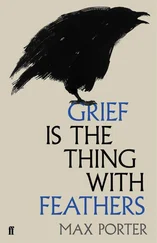When she and Mrs. Woodhull were done, when all that was left was to wait for the paper to come back from the printers, she went to Gob’s house to rest. Maci had the feeling that she’d been running for weeks, building up speed to lend to her spear when she hurled it, and now that it had left her hand she was too tired to care where it landed. “Good night,” Gob said to her by way of greeting, when she went to his house on the last day of work on the November 2 paper. She sat down in one of his dusty parlor chairs and fell promptly asleep.
Here is New York after the change , her hand wrote beneath a drawing of a city that seemed to be made all of glass. Crystal bridges leaped off towards the horizon; Maci could only guess where they rested their other feet. Different bridges ran between buildings so tall Maci wondered if the ground would even be visible from their roofs. Three concentric suns hung in the sky.
And here is our family after the change , her hand wrote beneath another picture, this one a crowded group portrait. See how happy you look? See how everyone looks happy? Maci wanted to think that the occupants of the portrait looked merely smug, or simpering, but it was true that their faces and eyes seemed blessed with radiant joy. There she was, standing with Gob on one side of her, and Rob on the other. Her mother was there, looking composed and sane, holding up a book so Mrs. Woodhull might read the title off the spine. There was Private Vanderbilt, stooping to kiss Tennie as she held the hand of a man Maci did not recognize, a long-faced fellow in the uniform of a Union soldier. Dr. Fie was standing with his hand on the shoulder of a smaller man, who resembled him in the face. Maci’s father, Miss Suter, Aunt Amy and the man Maci knew must be her husband — these were just the people in front. There were rows and rows of people behind them, and even those whose features were made indistinguishable by distance managed somehow to project great happiness. Everyone was happy except Gob, who knelt with his head bowed, weeping at the feet of a soldier boy that Maci knew was his brother. The boy had a bugle in one hand. The other rested on Gob’s head.
Dear Aunt , Maci wrote. I am a fugitive from justice. There is a man named Anthony Comstock who perceives me as having committed a grave sin against him. He’s taken offence at our Weekly, greater even than Mr. Beecher, who maintains what seems to me an embarrassed silence about his exposure as an amative hypocrite. I know how you love the Beechers, Aunt, and I feel obligated to say that we never really meant him any harm. It wasn’t out of spite for Mr. Beecher that we burst our bomb over Brooklyn. Mrs. Woodhull herself said she has no fault to find with him in any sense as that in which the world will condemn him. The fault and the wrong were not with him, or with Mrs. Tilton, but with the false social institutions under which we still live, while the more advanced men and women of the world have outgrown them in spirit. Practically everybody is living a false life, by professing a conformity which they do not feel and do not live, and which they cannot feel and live any more than the grown boy can reenter the clothes of his early childhood. So you see I had no malicious intent against Mr. Beecher, and certainly none against Mr. Comstock (though I know for a fact he shoots dogs for sport). Yet that man is determined, if he can find me, to put me in jail, where he has put Mrs. Woodhull, her husband, and her sister. But Aunt, you mustn’t worry that I’ll rot in the Tombs waiting for a trial at which justice will no doubt prove elusive, or that I’ll flee to Boston to make unreasonable demands of our relation, and compromise you with my fugitive presence. I am well hidden here.
Maci went about outside disguised as a man, with her hair under a hat, and a beard made of real man-hair that Gob pasted on her face in the morning. On warm days it slipped a little after a few hours of wear, but on cold ones it stuck fast till evening. She registered to vote in her disguise, and voted under Rob’s name on November 5 of 1872. She’d never believe the reports that came later, that Mrs. Woodhull never got a single vote, because Maci cast hers for the lady, and she knew that Gob had, too.
“How are things on the outside?” Tennie asked her, when Maci went to visit her and Mrs. Woodhull at Ludlow Street Jail. There were difficulties with the bail — every time a supporter provided the money to free the sisters, they’d be arrested again. Maci wrote outraged letters every day to five different papers.
“Dull,” Maci said, though really she was caught up in an excitement of writing and building. Her days were structured — agitate in the morning, go out in the city in her disguise during the day, build at night. She wandered in a mixed state of belief and disbelief. Sometimes when she was walking alone she’d look at her passing reflection in a shop window and not believe it could possibly be her under those clothes; other times it seemed the natural fruition of the past two years’ events, to be walking the city as a man. Likewise, she’d wander in Gob’s house, not believing it could be her hand that helped shape the machine that was growing every day until it was no longer possible to distinguish it from the house itself. “What are you doing?” she’d ask her reflection, a lady in men’s clothes with glue on her face, her hat off, her hair down, a pencil in her left hand and a pen in her right. Sometimes she would just stare and stare, wondering if she shouldn’t break the mirror that showed her such a thing. “I don’t believe it,” she’d whisper, but it was getting harder to say that. “Why not?” she’d ask, experimentally, of her reflection, and a voice in her mind — her own voice, the voice of murine sanity — would say, Simply because it is never so, and never has been so, and never will be.
“It’s a poor likeness,” Gob said. One day, after visiting the jail, Maci and Gob came to a museum on the Bowery where all sorts of sensational persons and things were on display: a three-hundred-pound lady, tattooed over every inch of her massive body — she was called the Mystic Bulk; a man who could swallow half his arm and spit it out again; and a woman who juggled with her feet the body of her amputee husband, a distinguished veteran who had lost all his limbs at Sayler’s Creek. Mrs. Woodhull’s likeness was featured in a display of wax figures called “Dante’s Inferno.” Here you could see personalities writhing in eternal torment. Mrs. Woodhull’s figure had recently been added. It really was a poor likeness, obviously executed from Mr. Nast’s cartoon, the one that portrayed Mrs. Woodhull as Mrs. Satan, who beckoned to downtrodden wives with the promise of salvation through Free Love. Her hair was done up in horns, and she sported a cloak that flared out behind her like bat wings. In such an outfit, Maci thought she’d more properly be depicted as an infernal administrator, but she was suffering just like any other of the damned, writhing with her hands lifted up in a gesture of supplication, and a look of weakness and horror on her face such as Maci had never seen on her, and knew she never would.
Mr. Beecher was writhing beside Mrs. Woodhull, and Mr. and Mrs. Tilton were there too, all of them licked by flames fashioned from orange and red cotton. It was a depiction of Hell less convincing than the scene in the caisson, and Maci said so. She took out a pad of paper and pencil from her coat and began to sketch the thing inexpertly with her right hand — Mrs. Woodhull had heard about the display, and wanted to know what it looked like. Her left hand plucked away the pencil and took over the work. “Thank you,” Maci said politely. Her eyes and her attention were free to wander. She watched her husband standing at a recreation of Mr. Lincoln’s funeral catafalque, which had been on view in City Hall seven years before. Gob stood peering down at the wax face. “Another poor likeness,” he called back to her. She walked after him, still sketching, and she paused before a set of twisted mirrors that tortured her reflection. She was short and fat in one, immensely tall in the other.
Читать дальше












